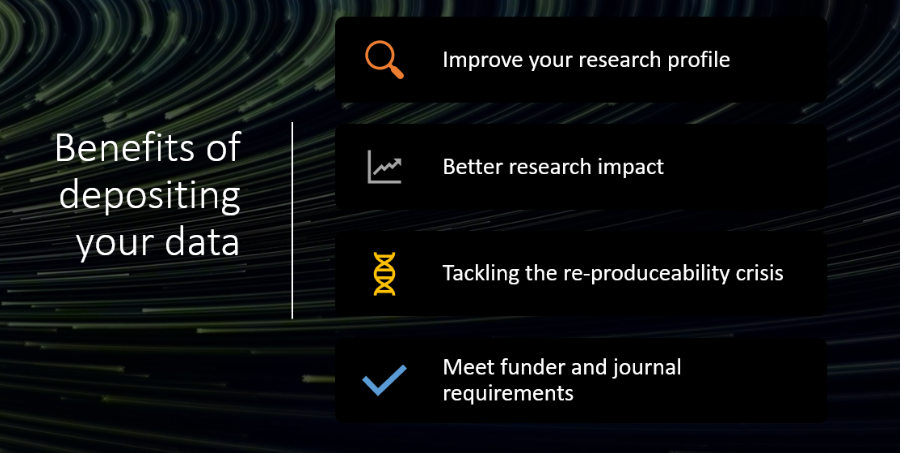Depositing your data is a key activity when a research project is concluded. Key benefits to doing so are:
Long-term preservation
When archiving/ depositing your data, you are taking the first step in maintaining your data for the long-term. Data repositories will store and preserve your research data securely and that means you do not have to think about the prospect of losing your data in the foreseeable future. Repository staff are then responsible for the curation, discoverability, and accessibility of your data.
Get published, get cited
Depositing your data does not replace the process of publishing a research article. It enhances it. In fact, funders increasingly require data publication when they are providing a grant, and journals are aligning themselves with this process by asking the data to be published alongside with your article.
Citations are important to demonstrate impact and depositing your data can have a positive impact to your research profile through citations of your research data when re-used by other researchers. Sharing your data can also lead to further collaborations.

Image 1: Benefits of depositing research data
Enable further research
Datasets can complement other research efforts and generate new results when examined in new contexts. Moreover, when depositing your data, you are enabling the research community to benefit from your data, ensuring research efforts of your peers are directed into new areas. Finally, sharing your data transparently contributes to tackling the wider re-produceability crisis, whereby publishing your data you are allowing other researchers to test and verify the validity of your results.
Where to deposit
Ideally, when your research project has been finalised, you will deposit your data to a repository that is related to your discipline. You can identify suitable services using the Registry of Research Data Repositories (re3data). Note that there are charges associated with some repositories.
Alternatively, you can deposit your data with BU’s own data repository (BORDaR). There is no charge, and a Digital Object Identifier (DOI) will be generated which you can pass on to publishers to link any outputs to the original data.
It is helpful to consider where to deposit your data at the start of a research project, and to plan for any resources needed to prepare your data for publication. To this end, a Data Management Plan (DMP) should be completed at the start of every research project.
Further guidance can be found in the Library’s Research Data Management guide. If you have any specific questions, you can also email us at: bordar@bournemouth.ac.uk.











 Conversation article: London Marathon – how visually impaired people run
Conversation article: London Marathon – how visually impaired people run Horizon Europe News – December 2023
Horizon Europe News – December 2023